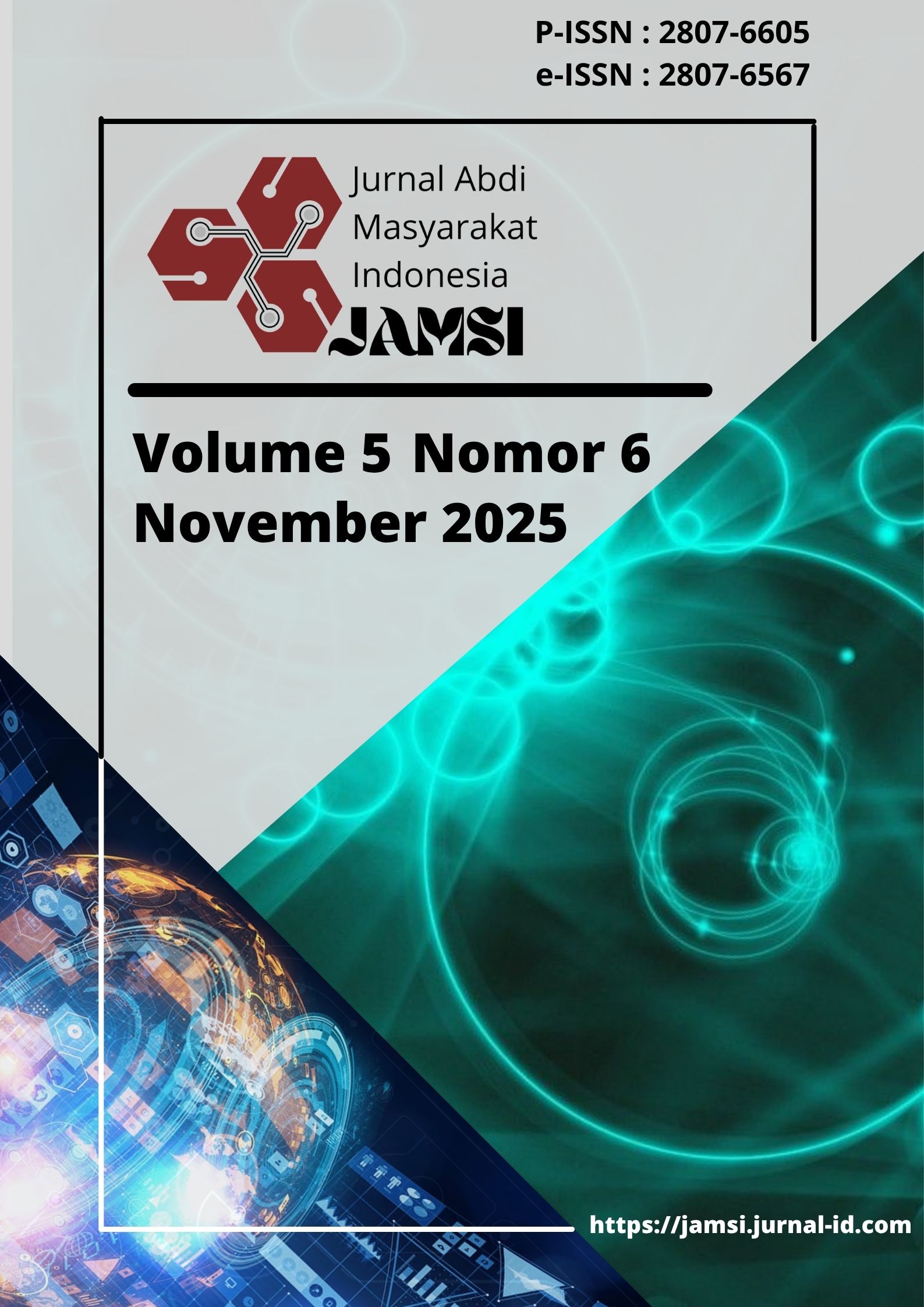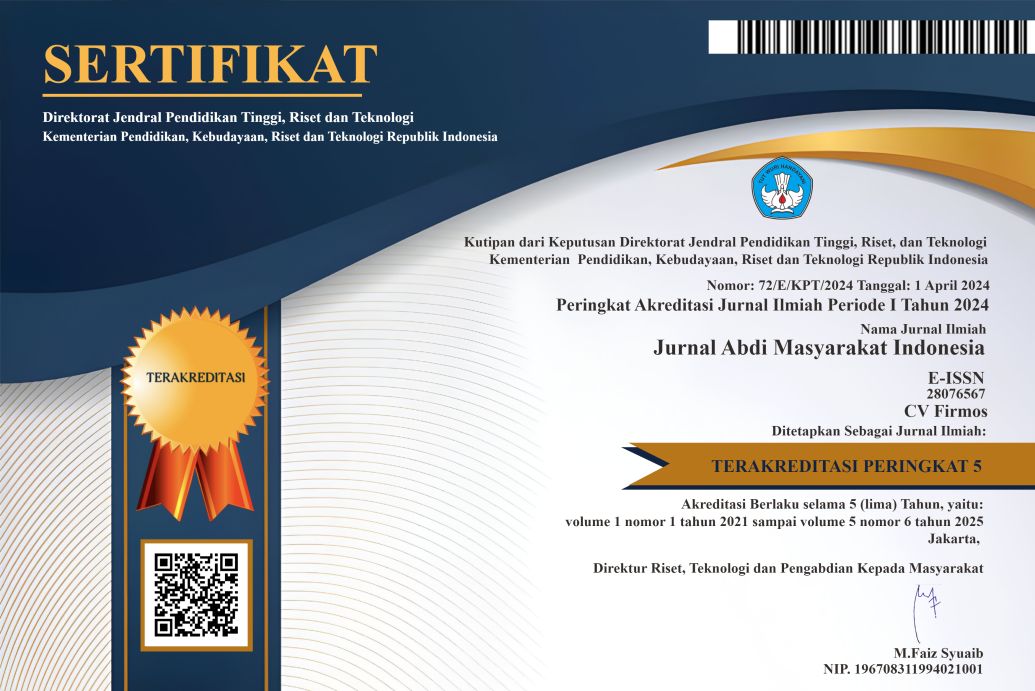Penguatan Kerjasama Asean melalui Program Kuliah Kerja Nyata Internasional Universitas Jenderal Soedirman di Desa An Nhơn Tây, Distrik Củ Chi, Kota Ho Chi Minh, Vietnam
DOI:
https://doi.org/10.54082/jamsi.2229Kata Kunci:
ASEAN, Diplomasi Publik, Kuliah Kerja Nyata Internasional, Pengabdian Masyarakat, VietnamAbstrak
People-to-people connectivity merupakan pilar strategis integrasi ASEAN, namun implementasinya melalui program pengabdian masyarakat lintas negara masih terbatas. Penelitian ini menganalisis efektivitas program Kuliah Kerja Nyata (KKN) Internasional Universitas Jenderal Soedirman di Desa An Nhơn Tây, Distrik Củ Chi, Kota Ho Chi Minh, Vietnam (5 Juli–2 Agustus 2025), yang melibatkan delapan mahasiswa Indonesia bersama mitra dari Vietnam dan Malaysia. Hasil kegiatan menunjukkan tiga capaian utama: (1) peningkatan kapasitas pendidikan anak-anak desa melalui pembelajaran bahasa Inggris interaktif; (2) kontribusi pada pembangunan lokal melalui pembuatan mural edukatif dan perbaikan akses jalan; serta (3) penguatan jejaring masyarakat lintas negara ASEAN melalui kegiatan ASEAN Day dan interaksi informal lainnya. Program ini menunjukkan bahwa kegiatan pengabdian masyarakat internasional oleh perguruan tinggi, tidak hanya mampu memberikan manfaat nyata bagi mitra, tetapi juga memperkuat hubungan antarwarga ASEAN. Temuan ini diharapkan dapat menjadi model replikasi bagi program serupa, dengan rekomendasi penguatan pada koordinasi institusional dan pembekalan lintas budaya.
Referensi
Acharya, A. (2014). Constructing a Security Community in Southeast Asia: ASEAN and the Problem of Regional Order (3rd ed.). Routledge.
Aggestam, K. (2006). Two-track diplomacy: Negotiations between Israel and the PLO through open and secret channels. Davis Papers on Israel's Foreign Policy, 53, 1-32. https://portal.research.lu.se/en/publications/two-track-diplomacy-negotiations-between-israel-and-the-plo-throu
Ang, I., Isar, Y. R., & Mar, P. (2015). Cultural diplomacy: Beyond the national interest? International Journal of Cultural Policy, 21(4), 365-381. https://doi.org/10.1080/10286632.2015.1042474
ASEAN Secretariat. (2015). ASEAN Community Vision 2025. https://asean.org/wp-content/uploads/images/2015/November/aec-page/ASEAN-Community-Vision-2025.pdf
Bahrudin, C., Az-Zahra, M., Ajizah, H., Izzati, I., S., I. V., Jaenuddin, Julianti, Husniati, N., Aulia, P. P., Maulida, Z., & Muliana. (2024). Peran Kuliah Kerja Nyata (Kkn) dalam Mewujudkan Sustainable Development Goals (Sdgs) Di Desa Wanaherang. Servirisma, 4(1), 59–68. https://doi.org/10.21460/servirisma.2024.41.65
Bringle, R. G., & Hatcher, J. A. (2007). Civic engagement and service learning: Implications for higher education in America and South Africa. Education as Change, 11(3), 79-85. https://doi.org/10.1080/16823200709487181
Checkel, J. T. (2005). International institutions and socialization in Europe: Introduction and framework. International Organization, 59(4), 801-826. https://doi.org/10.1162/0162288054825069
Collins, A. (2013). Building a people-oriented security community: ASEAN's human security agenda. Global Governance, 19(3), 373-390. https://doi.org/10.1080/13547860.2013.780518
Crabtree, R. D. (2008). Theoretical foundations for international service-learning. Michigan Journal of Community Service Learning, 15(1), 18-36. https://scholars.lmu.edu/en/publications/theoretical-foundations-for-international-service-learning
Dosch, J. (2008). ASEAN's reluctant liberal turn and the thorny road to democracy promotion. The Pacific Review, 21(4), 527-545. https://doi.org/10.1080/13547860802014107
Gay, G. (2018). Culturally Responsive Teaching: Theory, Research, and Practice (3rd ed.). Teachers College Press.
Gulrajani, N. (2016). Bilateral versus multilateral aid channels: Strategic choices for donors. ODI Working Paper, 422, 1-44. https://odi.org/en/publications/bilateral-versus-multilateral-aid-channels-strategic-choices-for-donors/
Hemmer, C., & Katzenstein, P. J. (2002). Why is there no NATO in Asia? Collective identity, regionalism, and the origins of multilateralism. International Organization, 56(3), 575-607. https://doi.org/10.1162/016228802760199890
Jetschke, A., & Murray, P. (2021). Diffusing regional integration: The EU and Southeast Asia. The Pacific Review, 34(4), 575-606. https://doi.org/10.1080/13547860.2021.1916223
Keohane, R. O., & Nye, J. S. (2011). Power and Interdependence (4th ed.). Longman.
Kerzner, H. (2017). Project Management: A Systems Approach to Planning, Scheduling, and Controlling (12th ed.). John Wiley & Sons.
Kretzmann, J., & McKnight, J. (1993). Building Communities from the Inside Out: A Path Toward Finding and Mobilizing a Community's Assets. ACTA Publications.
Kurlantzick, J. (2007). Charm Offensive: How China's Soft Power Is Transforming the World. Yale University Press.
Mehta, R., Zhu, R. J., & Cheema, A. (2009). Is noise always bad? Exploring the effects of ambient noise on creative cognition. Journal of Consumer Research, 39(4), 784-799. https://doi.org/10.1086/665048
Melissen, J. (Ed.). (2005). The New Public Diplomacy: Soft Power in International Relations. Palgrave Macmillan.
Moorthy, R., & Benny, G. (2013). Is an 'ASEAN Community' possible? A public perception analysis in Indonesia, Malaysia, and Singapore on the perceived obstacles for regional integration. Asian Survey, 53(2), 231-257. https://doi.org/10.1525/as.2013.53.2.231
Mufaizah, M., Rodiyah, S., Ikwan, M., & Mahaphaksi, M. (2025). Peranan Kuliah Kerja Nyata (Kkn) Mahasiswa dalam Kehidupan Bermasyarakat. MAJU: Indonesian Journal of Community Empowerment, 2(1), 173-178. https://doi.org/10.62335/na3nq513
Nye, J. S. (2004). Soft Power: The Means to Success in World Politics. PublicAffairs.
Pamment, J. (2013). New Public Diplomacy in the 21st Century: A Comparative Study of Policy and Practice. Routledge.
Putnam, R. D. (2000). Bowling Alone: The Collapse and Revival of American Community. Simon & Schuster.
Robertson, R. (1995). Glocalization: Time-space and homogeneity-heterogeneity. In M. Featherstone, S. Lash, & R. Robertson (Eds.), Global Modernities (pp. 25-44). Sage.
Slaughter, A. M. (2004). A New World Order. Princeton University Press.
Widyanti, R. T., Novitasari, S., Novitasari, C., Pratama, M. R. A., Iskandarsyah, M., & Murjainah. (2023). Pengabdian masyarakat melalui kuliah kerja nyata (KKN) mahasiswa di Kecamatan Kalidoni Kota Palembang. Journal of Community Services in Humanities and Social Sciences, 5(2), 45–54. https://ejournal.unibo.ac.id/index.php/Dedication/article/view/968
Vygotsky, L. S. (1978). Mind in Society: The Development of Higher Psychological Processes. Harvard University Press.
Wojciuk, A. (2018). Empowering the state: Universities as diplomatic actors. International Studies Review, 20(4), 674-696. https://doi.org/10.1093/isr/viy038
Unduhan
Diterbitkan
Cara Mengutip
Terbitan
Bagian
Lisensi
Hak Cipta (c) 2025 Elpeni Fitrah, Condro Wibowo, Berliana Nauli Alriansyah Manurung, Nisrina Nisrina; Haliza Nurazizah; Muhammad Ishthifa Oasis

Artikel ini berlisensi Creative Commons Attribution 4.0 International License.


















